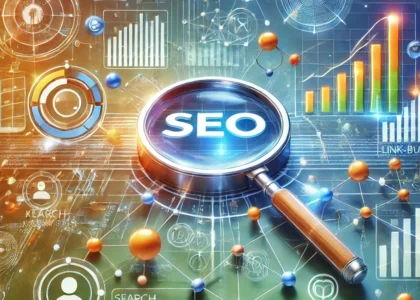In today’s digital age, establishing a strong online presence is crucial for businesses of all sizes. Digital marketing offers a dynamic and cost-effective way to reach your target audience, engage with customers, and drive sales. Whether you’re a seasoned marketer or just getting started, this comprehensive guide will help you navigate the ever-evolving world of digital marketing.
What is Digital Marketing?
Digital marketing encompasses all marketing efforts that use the internet or an electronic device. Businesses leverage digital channels such as search engines, social media, email, and websites to connect with current and prospective customers. Unlike traditional marketing, digital marketing allows for real-time feedback and measurable results, making it an essential tool for modern businesses.
Key Components of Digital Marketing
- Search Engine Optimization (SEO)
- Definition: SEO is the practice of optimizing your website to rank higher in search engine results pages (SERPs) and attract organic traffic.
- Why It’s Important: Higher rankings lead to increased visibility, credibility, and traffic.
- Tips: Conduct keyword research, optimize on-page elements (titles, meta descriptions, headers), build quality backlinks, and regularly update your content.
- Content Marketing
- Definition: Content marketing involves creating and distributing valuable, relevant, and consistent content to attract and retain a clearly defined audience.
- Why It’s Important: Engaging content helps build trust, authority, and customer loyalty.
- Tips: Focus on quality over quantity, use a mix of content types (blogs, videos, infographics), and promote your content across various channels.
- Social Media Marketing
- Definition: Social media marketing is the use of social media platforms to connect with your audience, build your brand, and drive traffic to your website.
- Why It’s Important: Social media provides a direct line to your customers and allows for real-time interaction and feedback.
- Tips: Choose the right platforms for your audience, post regularly, engage with your followers, and use analytics to measure success.
- Pay-Per-Click (PPC) Advertising
- Definition: PPC is an online advertising model where advertisers pay each time a user clicks on one of their ads.
- Why It’s Important: PPC offers immediate visibility and can be highly targeted, making it a great way to drive traffic and conversions.
- Tips: Use keyword research to inform your ad strategy, create compelling ad copy, and regularly monitor and adjust your campaigns.
- Email Marketing
- Definition: Email marketing involves sending targeted emails to your audience to promote products, share news, or build relationships.
- Why It’s Important: Email marketing is highly cost-effective and offers a direct way to communicate with your customers.
- Tips: Build a quality email list, personalize your messages, and use A/B testing to optimize your campaigns.
- Affiliate Marketing
- Definition: Affiliate marketing is a performance-based marketing strategy where businesses reward affiliates for driving traffic or sales through their referrals.
- Why It’s Important: It allows businesses to leverage the influence of others to reach a broader audience.
- Tips: Choose reputable affiliates, provide them with the necessary tools and resources, and monitor performance regularly.
The Benefits of Digital Marketing
- Cost-Effective: Digital marketing offers a more affordable alternative to traditional marketing methods, making it accessible to businesses of all sizes.
- Measurable Results: Digital marketing provides detailed analytics that allow you to track and measure the success of your campaigns in real-time.
- Targeted Reach: With digital marketing, you can target specific demographics, interests, and behaviors, ensuring your message reaches the right audience.
- Increased Engagement: Digital channels offer various ways to engage with your audience, from social media interactions to email campaigns.
- Flexibility and Adaptability: Digital marketing strategies can be quickly adjusted based on performance data, allowing for continuous optimization.
Getting Started with Digital Marketing
- Define Your Goals: Start by setting clear, measurable goals for your digital marketing efforts. Whether it’s increasing website traffic, generating leads, or boosting sales, having defined objectives will guide your strategy.
- Know Your Audience: Conduct market research to understand your target audience’s needs, preferences, and online behavior. This will help you create relevant and engaging content.
- Develop a Strategy: Outline your digital marketing strategy, including which channels you’ll use, the type of content you’ll create, and how you’ll measure success.
- Create High-Quality Content: Focus on creating valuable and engaging content that resonates with your audience and supports your goals.
- Monitor and Adjust: Regularly review your analytics to track performance and make data-driven adjustments to your strategy.
Conclusion
Digital marketing is a powerful tool that can help businesses of all sizes achieve their goals. By leveraging the right strategies and continuously optimizing your efforts, you can build a strong online presence, engage with your audience, and drive growth. Start implementing these tips today and watch your digital marketing efforts pay off!






